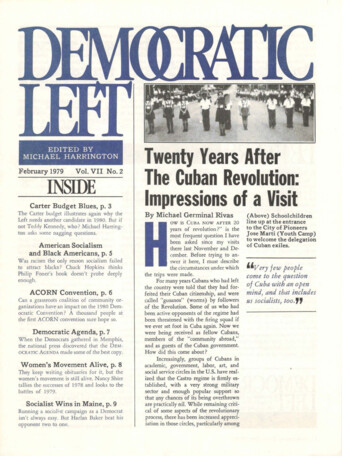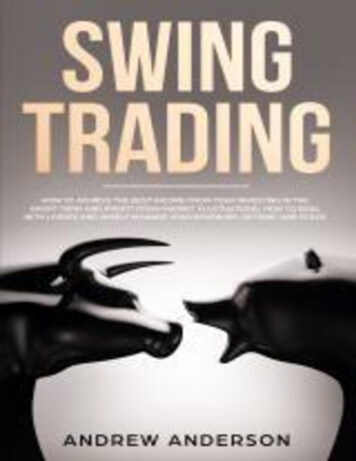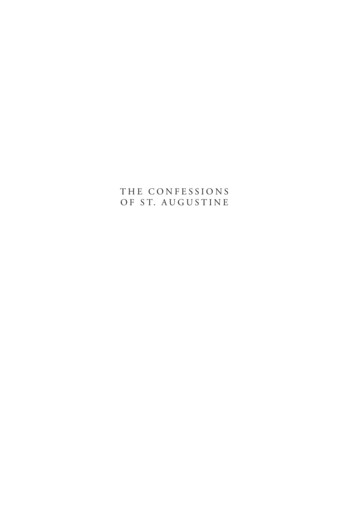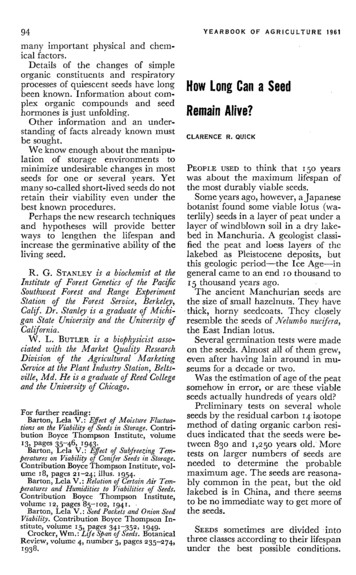
Transcription
EDITED BYMICHAEL HARRINGTONFebruary 1979Vol. VII No. 2INSIDECarter Budget Blues, p. 3The Carter budget iilustrates again why theLeft needs another candidate in 1980. But ifnot Ted ly Kennedy, who? Michael Harrington asks ome nagging questions.American Socialismand Black Americans, p. 5Was racism the only reason socialism failedto attract blacks? Chuck Hopkins thinksPhilip Foner's book doesn't probe deeplyenough.ACORN Convention, p. 6Can a grassroots coalition of community organizations have an impact on the 1980 Democratic Convention? A thousand people atthe first ACORN convention sure hope so.Democratic Agenda, p. 7When the Democrats gathered in Memphis,the national press discovered that the DEMOCRATIC AGENDA made some of the best copy.Women's Movement Alive, p. 8They keep writing obituaries for it, but thewomen's movement is still alive. Nancy Shiertallies the successes of 1978 and looks to thebattles of 1979.Socialist Wins in Maine, p. 9Running a sociaJi t campaign as a Democratisn't always easy. But Harlan Baker beat hisopponent two to one.Twenty Years AfterThe Cuban Revolution:Impressions of a VisitBy Michael Germinal RivasOW IS CUBA NOW AFTER 20years of revolution ?" is themost frequent question I havebeen asked since my visitsthere last November and December. Before trying to answer it here, I must describethe circumstances under whichthe trips were made.For many years Cubans who had leftthe country were told that they had forfeited their Cuban citizenship, and werecalled "gusanos" (worms) by followersof the Revolution. Some of us who hadbeen active opponents of the regime hadbeen threatened with the firing squad ifwe ever set foot in Cuba again. Now wewere being received as fellow Cubans,members of the "community abroad,"and as guests of the Cuban government.How did this come about?Increasingly, groups of Cubans inacademic, government, labor, art, andsocial service circles in the U.S. have realized that the Castro regime is firmly established, with a very strong militarysector and enough popular support sothat ny chances of its being overthrownare practically nil. While remaining criti·cal of some aspects of the revolutionaryprocess, there has been increased appreciiation in those circles, particularly among(Above) Schoolchildrenline up at the entranceto the City of PioneersJose Marti (Youth Camp)to welcome the delegationof Cuban exiles.' 'very few peoplecome to the questionof Cuba with an openmind, and that includesus socialists, too. ,,
the younger generation, for the undeniable accomplishments of the Revolution,especially in the fields of education andmedicine.Among the groups sharing that perspective of basic support for the CubanRevolution was the Cuban Christians forJustice and Freedom group to which Ibelong, which is made up mainly of Protestant Christians interested in social andpolitical issues from a religious standpoint. This group issued a call, back in1975 to then President Ford and thenewly-elected Congress to take a freshlook at Cuba with the goal of lifting theeconomic embargo against it and resuming normal diplomatic relations. We saidthen that the time had come for dialoguerather than confrontation. Other CubanLeft groups have since joined in that call.On September 6, 1978 President Fidel Castro acknowledged these developments in a press conference in Havana rowhich even Cuban exile newspaper people were invited. He expressed the viewsof the Cuban government that not allCubans living abroad were counterrevolutionaries, and that he was interested inentering a "dialogue" with representatives from the emigre community. Thestated purpose of that dialogue was todiscuss several issues of acute concern toall Cubans, such as the release of politicalprisoners, the start of new, limited emigration of Cubans so that families thatwere separated when refugee flights fromCuba to the United States were haltedseveral years ago could be reunited, andthe granting of permits to visit Cuba toCubans living abroad.Preparation for this proposed meeting and dialogue included numerousmeetings and conversations with Cubangovernment officials as well as a trip toTo the Editor:ability of the system. Profits are the precondition for expansion. By its borowing on the capital markets, the state isgiven the financial ability to mobilizelabor and means of production to providepublic goods and services. These government goods and services create expandedincomes which are not matched by ma1'keted output. Consequently the rate ofgrowth of income, if not sterilized byincreasing taxes, exceeds the rate at whichcommodity production grows. Businessthen becomes the transmission belt forinflation-whether competitive or monopolistic. Business merely exploits themechanism of deficit spending.Stagflation is the result of decliningprofit and Keynesian policy-of publicintervention in the context of marketrelations.The thrust of COIN's program apparently is the creation of institutiom ofdemocratic planning, of socializationcommissions. But Keynesian theory denies the necessity for just such institutions. Practice often runs ahead of theory,yet it is theory that ultimately justifies theprogram. Let us hope that the socialistmovement will provide the theoreticalmuscle for COIN's provocative project.Roger Hickey's article, "Fighting Inflation," in the December 1978 NEWSLETTER presents a promi.sing and commendable strategy for coalescing a demmocratic Left majority. Yet COIN'sunderstanding of inflation seems to resort to the overworn argument of monopoly responsibility.The truth is more complex and indicates that it is liberal social programsexecuted within the context of capitalistmarket relations which trigger "stagflation." That is why liberals and conservatives are both quite discerning, if shortof convincing, in denouncing eachother's programs.For inflation to occur, there must bea sufficient monetary demand to supporta general increase in the price level .Keynesian intervention policies, adoptedas the outcome of the Great Depression,treat the symptoms of capitalist crisesi.e., declining demand. But this demandinsufficiency is merely the manifestationof a rate of capital formation which lacksthe vibrancy to support full employment.The rate of capital accumulation is func·tionally determined by the overall profit-DEMOCRATICIBFfFormerly theNewsletter of theDemocratic LeftMichael HarringtonEditorMaxine PhillipsManaging EditorJack ClarkNational SecretaryContinued on page 10Barry FingerJackson Heights, N.Y. To the Editor:Jim Chapin (December 1978) takesa good analysis too far. Carter, he argues,has become irrelevant to the Left andthere is no reason to prefer him to amoderate Republican in 1980. Ten yearsago such reasoning led many of us intothe "dump Johnson" movement. Wesucceeded in removing a skilled politicalleader from the White House because ofhis Indochina policies. But our "success"was illusory. Having dumped Johnson,we ended up with Nixon and Agnew(two Republican moderates). The warwent on, the Left was attacked and shattered, decent programs of the Great Society were dismantled, poverty increasedand the Supreme Court was stacked tothe Right for a generation to come. Ifwe dump Carter, do we figure to do anybetter?Rosemary HillSan Jose, Calif.DEMOCRATIC LEFT is published ten times a vear(monthly except July and August) by the Democratic Socialist Organizing Committee, 853Broadway, Room 617. Kew York, N .Y 10003.Telephone (212) 260-3270. Subscription rates:Sustaining 10 per year; Regular S5 per year;Limited income S2.50.Second Class Permit Paid at New York, N Y2DEMOCRATIC LEFTFeb. 1979
Carter Budget:Unraveling the Social ContractBy Michael HarringtonHE URTER ADMINISTRATIONis drifting toward the worst ofseveral worlds. It is promotinga recession which will not significantly reduce inflation. It iscarrying out budget cuts thatthreaten to unravel some of thebasic democratic Left achievements of the past generation. It is raisingmilitary spending in an irresponsible,ineffective and socially cruel way. And itis ignoring the real sources of inflation.In the presence of such a strategy onthe part of a Democratic President, progressive Democrats and other membersof the democratic Left have begun todevelop a coherent counter program. Although far from finished, it is at leastin process. Still, there is an ominousproblem in this area : the Left is becoming more and more dependent on Senator Edward Kennedy. Kennedy, makeno mistake about it, is the very best person to challenge Carter in the name ofliberal principles. But what if Kennedy,for whatever reason, decides not to makethat challenge? To whom would the Leftturn as a serious standard bearer?Before dealing with that tactical question, it is important to fill in some of theanalytic details of my opening attack onthe Administration. First, there is thestrange, and perhaps tragic, fact that theWhite House is following policieswhich , in its more reflective moments, itknows will not work. In January of 1978the Council of Economic Advisors considered whether or not it would be possible to reduce inflation significantly bymeans of an economic slowdown, i.e.,by means of the traditional, and obsolete,wisdom of the "Phillips Curve." TheCouncil answered candidly: it would takesix years of "very high" unemployment,and 600 billion in lost pr duclion, todo the job.A slowdown of that dimension is politically unthinkable in America, even fora Republican Administration and certainly for a Democratic President. ButThe Guardian/ cpf' ' It is not surprising that WallStreet takes such a position,which is in a Jong, dishonorableand caJJous tradition. But why isthe White House followingsuch a line?' 'why, then, Mr. Carter's obsession withholding the budget to the mystic numberof a 30 billion deficit? Why cuts whichwill surely hurt the poor, and monetarypolicies which will help bring along arecession? The answer, I suspect, couldbe shocking: Washington does not knowwhat else to do; so it is stumbling intoa downturn. Last May, Barry Bosworth,the sometimes outspoken head of theCouncil on Wage and Price Stability,put it this way: "A recession is likelybecause that has always been the government's anti-inflation policy." A recession, we would add, which won't work.Rich F avor R ecessionThe corporate rich, as so often happens, are more brutally candid than thepoliticians. In December, a WaLI Streetf ournalreport told how a good portionof the business community is in favorof a downturn. There were, the f ournaJsaid, " no illu ions" that a recessionwould cure inflation. To do that, the executives held, would take a " balancedfederal budget over a period of someyears, with only a modest deficit permitted during a recession." The layoffsadvocated by business would only temper inflation, the f ournal said, but that isgood enough for capital. One happy result, the article concluded, would beholding back wage increases-but therewas a fear that such a policy mightboomerang and cause increased workermilitancy.It is not surprising that Wall Streettakes such a position, which is in a long,dishonorable and callous tradition. Butwhy is the White House following sucha line ?That question becomes compellingwhen one considers what might be calledthe "unraveling" of the gains in socialand economic justice from the New Dealto the Great Society. Social Security is acase in point. At year's end, when theAdministration was simultaneously playing Scrooge and Tiny Tim, leaking horror stories of cuts and happy reports offunds restored, the nation was told thatFeb. 1979DEMOCRATIC LEFT3
a number of Social Security benefitswould be curtailed. For example, lowwage workers who had been entitled tominimum benefits within the systemwould now be turned over to Supplemental Security Income (SSI) where thepayments would be lower and theywould be subject to a means test.The amount of money involved inFiscal 1980 (which is what the currentbudget discussions are about) is minimal. Indeed, if every single cut hintedat by the Administration thus far wererevoked, there would be a negligibleimpact on inflation. The White House,it must be remembered, is engaged insymbolic politics which, by its own economic analysis, will not have the supposedly intended effect. But it is a grimportent that the single most importantliberal gain of the past 4:: years, SocialSecurify, is now subject to politicalgames. Moreover, it is a sign that thenation may be getting ready to break itscompact with the aging because it cannot come to grips with stagflation. Onecould cite other examples of the unraveling : the retreat on national healthcommitments; the Administration's collapse on natural gas deregulation (anissue on which, in the past, the democratic Left prevailed over Eisenhower);Carter's about-face on the capital gainsgiveaway where be pulled a Jerry Brownby embracing a bad idea he bad rightlyfought; and so on.All of these developments are highlighted by the pledge to increase realmilitary spending by 3 percent. DefenseSecretary Brown has just admitted thathis department is rife with waste. Thus,to commit Washington to increasedspending-not effectiveness, but spending-the President is following the worstof bureaucratic traditions. Why doesone go over the social budget with amicroscope and design the military budget blindfolded? One must note thatmilitary spending, which creates incomebut no goods and services for the publicto buy, is the most inflationary singleelement in the federal budget.The Administration's priorities, then,mandate cuts which will certainly strikemost viciously at the black, the brown,the female and the young and authorizewasteful expenditures on products whichthreaten the very existence of humankind. Meanwhile, Washington scrupulously refrains from dealing with thereal causes of inflation.4DEMOCRATIC LEFTFeb. 1979''In the next period, then, thequestion of program and ofcandidate go hand in hand.''fight them. This is not to make the sectarian suggestion that America must firstbecome socialist before it can fight stagflation. It is to say that radical limitations upon corporate power-c.g., thepower of an oligopoly which is a "pricemaker" rather than a "price taker" to settheir own (monopoly) prices - arcneeded. These would not transform thefundamental basis of the system; butthey ace a step in that direction.Program in Searchof a President"And take some from here and tryit there."UAW W&Jhinaton lttportThe Real Causes of InflationIn.6ation is not the result of workers'wage demands, which have been tryingto keep up with price rises, not causingthem. Neither is it a consequence of increased federal spending, since Washington's percentage of GNP has remained remarkably stable over the lastquarter of a century. It comes, rather,from the ability of oligopolies to raiseprices during a recession to compensatefor declining volume; and from thestructural contradictions of our cruel andantiquated health system, our corporatedominatcd energy system, a farm policydominated by agribusiness and the governmental habit of crcatin g inflation inthe housing market by raising interestrates in the name of fighting inflation.(Those last "sectoral" points were firstdeveloped by Leslie Nulty.)At the Democratic Party Mid-teemConference this past December, the democratic Left adopted much of this analysis of inflation (indeed, this writer wasthe spokesperson for the liberal caucuson the issue) . Still, that understandingmust be deepened. The various examplesof corporate power promoting inflationin order to increase private advantageare neither random nor discrete. Theyarc inherent limitations in a welfarestate that rests upon late capitalist foundations and in which reforms tend tobe co-opted by the very corporate richwho, more often than not, first bitterlyIn the period leading up to 1980,however, it is not enough to get a democratic Left consensus on program. In1976, the Democratic Party passed a progressive domestic platform which theDemocratic President has ignored whenever he pleased. In 1980, one does not,it goes without saying, want to turn theWhite House over to a Republican whowould do enthusiastically and straightforwardly what Cartee does shamefacedly. But in 1980 one wants a candidatewho will act on a program that will dealwith inflation and achieve the full employment that remains the absolute precondition of every decent social programin the land. In the next period, then,the question of program and of candidate go hand in hand.Teddy Kennedy is the obvious candidate of the democratic Left. That is notbcause he will satisfy nostalgia andbring back Camelot. It is bcause he isthe outstanding liberal political leaderin the United States and has the capacityto win both the nomination and theelection. On health and tax policies, heis the acknowledged leader in the Congress. His record on criminal code legislation is more ambiguous, but it hardlymakes him a Rightist. .All in all, withhis limitations and his strengths, be is anextraordinarily appealing candidate.Within days of declaring for the Presidency he would have well-organizedmovements in fifty states and the Districtof Columbia.Who Besides Kennedy?But what if Kennedy decides not torun? Who is the liberal back-up candidate? I do not raise this point to indulgein polilical gossip but to focus on a serious issue. I do not see any serious candidate outside of Kennedy (defining "ser-
ious" as meaning capable of winningboth the nomination and the election) .The Republican Party presidential racenow looks like the beginning of the Boston Marathon. The Democrats have Carter, Kennedy and Brown, and when oneis talking about needing a candidate whowill really follow a progressive program,the latter's mercurial record is hardlyencouraging. In part, the dearth of serious Democratic hopefuls on the Left results from the scurrying of so many poticians to the center. The only problemwith that centrist position, as President''In part, the dearth of seriousDemocratic hopefuls on the Leftresults from the scurryingof so many politicians to thecenter.ffCarter demonstrates so well, is that itwill not solve any of the nation's basicproblems and will hurt the most vulnerable people in the society.The democratic Left, in short, hasBOOK REVIEWAMERICAN SOCIALISM AND BLACK AMERICANS: From the Age of Jackson to World WarII, by Philip S. Foner. Greenwood Press, 1978, 462pp., 22.95.By Chuck HopkinsNE OF THE MOST GLARING FAILURES OF THE LEFTin the United States has been the inability of theorists to develop a meaningful formulation of therace question. This, of course, is an historicalproblem, having arisen with the emergence of thecountry's first socialists. The question of the relationship between socialism and Afro-Americanliberation is given a new immediacy today as wewitness the dissolution of the hegemonic New Deal consensusand the efforts to build and consolidate a new one.Philip Foner's American SociaJiJm and Black Americans is an interesting work in that it gives us the opportunityto explore a contemporary problem with some understandingof its treatment in the past. His central theme is that the racismof white socialists prevented them from evolving a policy onthe race question that could attract black people to their ranksin large numbers. This argument is woven through the book,beginning with antebellum communitarian and utopian movements up until the 1939 activities of the Socialist Party on theeve of World War II.The book has good documentation to support Foner'sthesis and there probably would be few defenders of thisrather sordid history of racial bigotry on the part of thosecalling themselves socialists. Still, the reader has to be somewhat disturbed by the manner in which Foner makes his case.While he consistently criticizes his subjects for their almostuniform failure to interact with Afro-Americans on a basisof equality, he does not provide the reader with any suggestionof what might have been the proper path for socialists tofollow on this question.An interesting example of this point is Foner's treatment of socialists in the southern United States. In 1903,the Louisiana Socialist Party developed a program in which,among other things, it called for: collective ownership andcontrol of all sources and machinery of production and distribution; the adopting of the initiative, referendum and recallby the state; equal civil and political rights for men andmore than enough work during the nextperiod. It must develop a programagainst stagflation, i.e., not simplyagaimt inflation but also for full employment. It must translate that program intolanguage which the person on the street,who is now utterly confused, can understand. And it must mount a challengeto Carter's policy, not simply in the formof a counter-program, but in the nameof an alternative candidate as well. Michael Harrington is the NationalChair of DSOC.women; absolute home rule for all towns and cities; andvoting rights for all races.After making these impressive statements, the groupcommitted the unpardonable error of calling for separatecommunities for black and white people, with each communityexercising control over its own affairs. The establishment presshad a field day with this proposal. It ridiculed the socialistsand successfully labeled them as racists. A long debate on theissue ensued within the Party, resolved only when the nationalleadership forced the Louisiana Party to delete the controversial proposal.Foner's discussion of this debate ignores all of theother proposals and their possible relationship to the one onseparate communities. He reduces the entire issue to the question of whether the socialists were ready to stand up and casttheir lot for something he calls "universal equality." Nowheredoes he explain what he means by this abstract term, nor doeshe tell the reader whether or not black people in Louisianain 1903 were rushing to get into white people's communities.Foner's integrationist sentiments are evident throughout his work. The criteria for his criticisms of socialists on therace queston all revolve around issues of integration and "universal equality." Such superficial categorization seriously detracts from any real efforts to come to grips with the difficultproblem of identifying areas of unity between the politicaldynamics of American socialism and those of black liberation.Socialists cannot confront the implications of these two processes by sinking to sloganeering about "universal equality."Even when he appears to recognize the importance ofrace in the issues he discusses, Foner explains it as a more orless special form of exploitation which white workers did nothave to contend with. He formulates the question as one of"whether the Negroes were a specially exploited section ofthe working class or just a general division of that class whohad no need for special attention and whose problems wouldbe solved . . . with the ushering in of socialism." He, ofcourse, opts for "special attention." In formulating the question in this manner, Foner is overlooking its most fundamentalcharacteristic, which is the political, economic, and culturaldomination of black people as a whole.Foner's rather simplistic approach also limits thetreatment of his black subjects. The black journalist T. ThomasFeb. 1979DEMOCRATIC LEFT5
Fortune, who wrote a book in 1884 in which he asserted thatthe denial of land to black people during Reconstruction wasat the root of their powerlessness, is criticized by Foner fornot advocating the true "principles of socialism." The readeris given no explanation of the possible relationship betweenthe struggles of black groups like the Colored National Farmers Alliance to acquire and hold land, and the "principles ofsocialism." This issue has particular significance for todaywhen the question of black land holdings is of such importancein the Afro-American community.Another interesting treatment of a black subject isthat of Hubert H. Harrison, "the father of socialism in Harlem." Harrison was a self-educated expert in African andAfro-American history. In 1909, he joined the New YorkSocialist Party and became a tireless speaker and organizerfor the group. But after eight years of struggling for changewithin the Party to increase black membership, he becamefrustrated with the white leadership's racism and resigned.Harrison then formed his own group, the AfroAmerican Liberty League, and began recruiting other blacksocialists to join him. The reader is given a good treatmentof the black socialist's critique against his white leaders byFoner for as long as he remained within the Party. But oncehe left, Foner dismisses him as a disgruntled black "radical"advocating "an amalgam of black nationalism and socialism,in which the former predominated." It would have been amuch more fruitful exercise if Foner had at least investigatedwhat Harrison had to say about his new views on nationalismACORN AimsFor NationalRole in 1980By Cary RogersHILE 1600 DEMOCRATICParty delegates gatheredin Memphis for what wassupposed to be a "love-in"for the Carter administration (see DEMOCRATICAGENDA story), morethan 1,000 delegates ofthe Association of Community Organizations for Reform Now (ACORN) met tosend a message to the Democratic Party.This first national ACORN actionmarked a departure from the organization's state and local focus. ACORN,which started eight years ago in LittleRock, Arkansas, is made up of low andmoderate income people organized incommunity groups in 14 states. These local groups work on neighborhood problems and coalesce on city and state cam6DEMOCRATIC LEFTFeb. 1979and socialism. Aparently for Foner, once having left the fold,Harrison no longer had historical relevance as a socialist.Both the socialist past and Foner's treatment of it pointto the need for today's socialists to create some new ways tolook at the problems we face. While there is an interconnectionbetween socialism and the black liberation movement, it is atbest a backward theory that would project the latter as a mereextension of the former. The fundamental character of theblack struggle remains as it always has-a displaced, subjugated people longing for the right of self-definition. Thechallenge for white socialists is not to fear this truth and forblack socialists not to apologize for it.One way of viewing the failure of American socialismis to focus, as Foner has, upon its racist past. Another way ofviewing this failure is to understand Afro-Americans' historical resistance against allowing themselves to be dissipated into"universal" cultural formations, whether they are called"workers," or "minorities," that do not speak to their reality.No human group in the world would voluntarily accept theprecarious status as an extension of a class of workers whohave again and again demonstrated their supremacist sentiments; nor would any human group voluntarily accept a designation as the minority of a proven antagonistic majority.The humanity of black people demands that they reject such formations also.Chuck Hopkins teaches political science at M ormt HolyokeCollege.paigns. The results are victories thatmembers can take pride in, encouragingfurther political participation by peoplewho have all too often been left out andignored. The goal is to build democraticorganizations that can gain power tobring about social change.ACORN's Memphis meeting focused on the theme "The People Speak" anc!included a mass raIIy at the ConventionCenter where the Democrats were meeting. Chanting "Jimmy who, Jimmy when,people won't be fooled again," memberschallenged the Democratic Party and thePresident to respond to their concerns.The platform approved by theACORN convention called for the Democratic Party to adopt "an affirmative action plan to guarantee low and moderateincome participation in the next majorParty event, the 1980 National Convention."Delegates were urged to organizeand elect delegates to the 1980 convention. The move toward participating innational Democratic politics is a first forACORN. One of the prime tenets of itsorganization has been the strategy of appealing to a "majority constituency" bygoing beyond the issues that concernstrictly "poor peoples' groups." It hasorganized blacks and whites wherever ithas been by appealing to pocketbook economic issues. Thus, its convention platform demands "lifeline" utility rates,free health care, decent housing, jobs andincome, fair taxes and laws to preservefamily farms and to force banks to investin local communities.The effect of ACORN's thrust intonational politics, if in any way successful, can only be a heartening turn ofevents for those of us on the democratic Left.Cary Rogers is a DSOC member fromKnoxville, T ennesue and is active inACORN.SAMPLE COPY OFFERSocialiJt Preu/ European Review, amonthly digest of extracts from European socialist newspapers, is available bysubscription 10 U.S.) frt m Foro Buonaparte 24, 20121 Milan, Italy. We have alimited supply of the December 1978 issue, which features an abstract of an article by Michael Harrington that appeared in Socialist Affairs. Send a stamped,self-addressed envelope to DEMOCRATICLEFT, 853 Boadway, Room 617, NewYork, N.Y. 10003.
DEMOCRATIC AGENDAHE DEMOCRATIC AGENDA HELPED MAKE SUREthat the recent Democratic Mid-term Conference inMemphis wasn't a love-in for the Carter Administration's policies, and the national press recognizedits accomplishment.'The AGENDA, a DSOC-led coalition of socialists, union members, Party liberals, blacks, feminists and community activists, fought in Memphisfor national health insurance now, energy industry reform,anti-corporate inflation policies, tax justice and funding fordomestic social programs.Jn the days leading up to the conference, reportersspeculated that THE DEMOCRATIC AGENDA would provide themajor interest at what would otherwise be a tightly managedevent. Dave Broder wrote in The Washmgton Post that "theDemoc
Running a sociaJi t campaign as a Democrat isn't always easy. But Harlan Baker beat his opponent two to one. Twenty Years After The Cuban Revolution: Impressions of a Visit By Michael Germinal Rivas OW IS CUBA NOW AFTER 20 years of revolu










